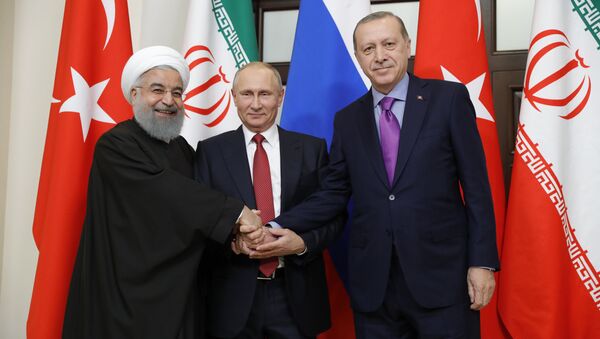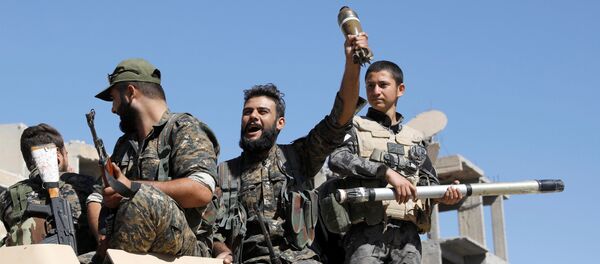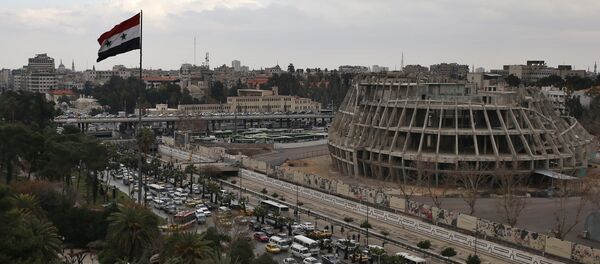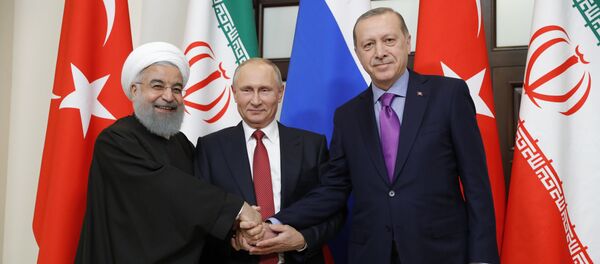Russia, Turkey and Iran have prevented Syria from falling into the abyss of a "chronic civil war" like the one which is currently tearing Libya apart, Professor Paulo Botta of the Complutense University of Madrid, told Sputnik Mundo.
The academic cited the words of Vladimir Putin about the efforts of Moscow, Ankara and Tehran to avert the disintegration of Syria and the humanitarian catastrophe in the country.
Botta recalled that during the six year-long conflict Western countries demanded that Syrian President Bashar al-Assad "must go," emphasizing this as a prerequisite for the resolution of the crisis.
Russia's involvement in Syria's affairs helped Damascus maintain its positions. Currently, no one casts into doubt that the Syrian president will stay in power while the peace process is going on, the academic remarked.
Echoing Botta, Gevorg Mirzayan, an associate professor at the Department of Political Science at the Finance University of the Russian Government, also highlighted the role of the Russia-Turkey-Iran triumvirate, dubbing it "the axis of order" in his recent op-ed for RIA Novosti.
The Russian academic explained that instead of fighting for dominance in the Middle East Moscow called upon all the parties involved "to team up in order to jointly maintain stability and sustainable development in the region." Thus, according to Mirzayan, Moscow is exercising a multi-polar approach to global affairs.
He noted that Russia has repeatedly offered the US to combine efforts to solve the Syrian issue. However, Moscow's plea fell on deaf ears in Washington.
"Now the situation has changed. While the Americans' are losing ground in the Middle East, an urgent demand for order has emerged," the RIA Novosti contributor noted, adding that in response Moscow, Tehran and Ankara have stepped in to save the day.
A joint statement released by the three heads of state after their talks declared that the countries' collaborative efforts in the 11 months since the establishment of the ceasefire regime in late December 2016 have helped to secure a "breakthrough" in "bringing closer the elimination of [Daesh], the Nusra Front and all other terrorist organizations as designated by the United Nations Security Council."
The leaders also emphasized the utmost importance of the Astana format, "which has already proved its effectiveness and contributed to significantly reducing the level of violence in Syria and creating the necessary conditions for the return of refugees and internally displaced persons."
According to Mirzayan, "this triumvirate of the victors over Daesh and al-Nusra Front will determine the future of the post-war Syria." The Russian academic noted that the recent Sochi summit has already been dubbed "the Mideast Yalta," after the Yalta Conference of 1945 on Europe's postwar reorganization.
Drawing historic parallels between Syria and Afghanistan of the 1980s, Botta recalled that many of Afghan mujahedeen and foreign fighters later took part in the Algerian Civil War (1991-2002) and uprisings in Yemen and Jordan.
"We need to strengthen cooperation, because without the exchange of information, unfortunately, these militants will find themselves in ideal conditions for committing terrorist attacks in all parts of the world," Botta concluded.





